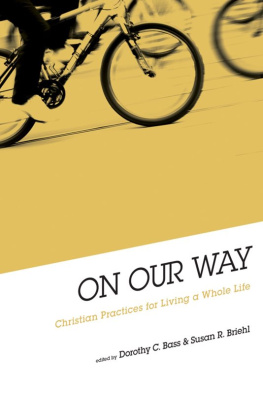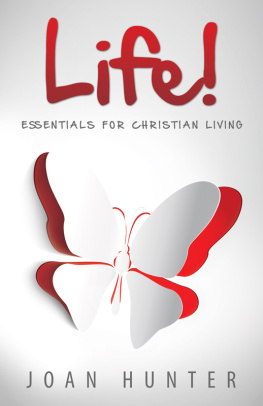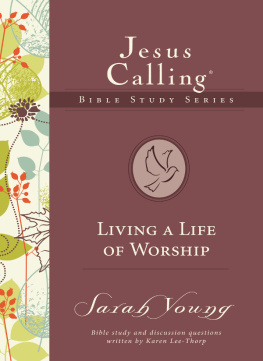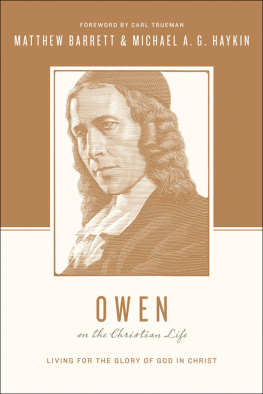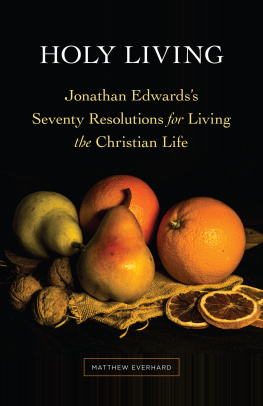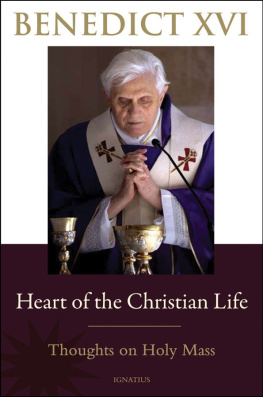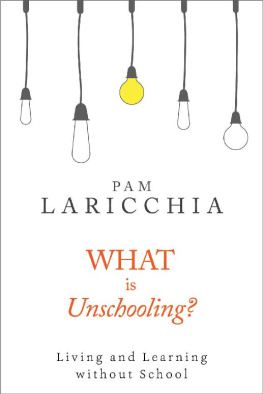The writing of this book was sponsored by the Valparaiso Project on the Education and Formation of People in Faith, a project of Lilly Endowment Inc., a private family foundation in Indianapolis. We are especially grateful to Craig Dykstra, senior vice president, religion, whose thinking and writing about Christian practices that form a whole life lived in the real world in response to Gods grace have deeply influenced this book.
The authors are grateful to those who responded to early drafts of this book: Alexx Campbell, Jack DePaolo, Timothy Frazier, Katherine Lytch, John Schwehn, Martha Schwehn, Clinton Trench, and Magdalena Briehl Wellsall of whom had contributed as teens to Way to Live: Christian Practices for Teens (Upper Room, 2002)and also Joel Bergeland and Jason Duba. Others read a later draft and engaged the authors in lively discussion: Alvin Black, Karnell Black, Hannah Cartwright, Daniel Cobbler, John Dahlstrand, Katherine English, Eldon Santiago, LaSheena Simmons, and Lydia Wylie-Kellerman. At the invitation of the authors, Pam Chao, Kate Foran, Allison Frost, Nathan Mustain, Robert Rich, Frank So, and Elizabeth Victor wrote personal essays about how they practice their faith. Much of what is good and true about On Our Way comes from the challenging questions, creative insights, and faithful testimony of these readers and writers.
During the writing process the authors gathered twice as a community; Central Lutheran Church (Minneapolis) and Fourth Presbyterian Church (Chicago) graciously received us. In Minneapolis, Mary Preus and Tom Witt, our treasured friends, led us in spirited song and prayer. In Chicago, Enuma Okoro, author of the online study guide for this book, served as a small-group facilitator. At both meetings and all along the way our colleague Don Richter was a trusted companion and worthy conversation partner.
Robin Pippin and Jeannie Crawford-Lee, our editors at Upper Room Books, were generous partners and patient guides as this book took shape. The work for this book was coordinated from the office of the Valparaiso Project on the Education and Formation of People in Faith. This project makes its home at Valparaiso University; the editors are grateful to the university for its support. We also thank Doretta Kurzinski, the Valparaiso Project Coordinator, who tended to the many details associated with author meetings, reader responses, manuscript preparation, and much more.
An online study guide for On Our Way and other resources on Christian practices are available at www.practicingourfaith.org, the Web site of the Valparaiso Project.
Dorothy C. Bass
I see in the rising generation a passionate yearning to live in a way that is good for our endangered planet, life-giving to others, and attentive to the presence of God. On Our Way is a response to this yearning. It is offered by a group of authors who belong to the diverse, imperfect, amazing community that has gathered around Jesus Christ across the centuries. Humbly, hopefully, and drawing on the deep wisdom of scripture and Christian tradition, these writers wrestle with questions of how to live alert to the needs of the contemporary world. Together, their chapters guide readers into the heart of discipleship: love of God and neighbor embodied in an ongoing way of life.
Wrestling with questions about how to live your life is part of being human. Where are you heading, and why, and with whom? Such questions are not reserved for people in a certain historical period or stage of life, but they are especially urgentand especially difficult to answerfor those coming of age in the twenty-first century. In todays world we all find ourselves overwhelmed with information but often moving too fast to seek wisdom. We are aware of massive problems but often disheartened about our ability to address them. As members of a growing, mobile, and religiously diverse global population, we are denied easy certainty. Amid widespread social and cultural change, we are given both the freedom and the burden of choice in many areas of life.
The years following high school, college, or graduate school provide crucial opportunities for considering your life as a whole. In modern industrial and postindustrial societies, those coming into adulthood generally are expected to develop vocational and personal commitments more or less on their own. So at a certain point in life, off you go, down one road or another, making more and more decisions on your own about money, relationships, what to study, what work to do, and how to respond to war, racism, poverty, violence, sickness, and need. Questions about how to spend your one, God-given life become more insistentand also more important, because how you live will have consequences not just for yourself but also for the world.
On Our Way invites you to explore a way of life that takes shape in response to the active presence of God in and for the world. We sometimes call this a way of life abundant, remembering the proclamation that Jesus came into the world to bring not just life but life that is abundant (John 10:10). All who embrace this way are joined to Jesus and to the community of Jesus disciples across the ages. Rooted in ancient wisdom while also moving toward the future, this way of life overflows with Gods justice, mercy, and lovenot only for the sake of those who believe but for the good of all.
*Exploring a Way of Life Abundant
Rather than considering this whole way of life at once, our focus will be on a number of practices that give it substance and shape. Attention to practices is helpful because it makes a way of life, which is a very big thing, more visible and more open to engagement, criticism, and transformation. Noticing, understanding, and living specific practices require us to see and do things that are of immense importance to the way of life in and for the world to which people of faith are called.
In the pages ahead, authors who have found themselves called to this way of life delve deeply into twelve practices that have been and continue to be important aspects of Christian life. Other practices could also be included, to be sure, but this set covers a wide enough swath of experience to show how practices can serve and strengthen a whole way of life. Each of these practices addresses fundamental needs that appear in every life and every societythe need to learn, for example, or to gain material sustenance, know another person intimately, care for the earth, or encounter strangers without harm. These are things that all peoplenot just those who are Christiando, so basic are they to who we are as human beings. What has been important to Christians over timeand what we now long for in our own dayis to do these things in ways that embody Gods justice and compassion for all.
Practices come to fruition in the lives of real people in the real world. Therefore Susan Briehl and I selected authors who bring personal passion and unique life experience to each of the practices under consideration. These authors, who come from a variety of backgrounds and Christian denominations, are people of inspiring commitment and deep insight, and it is a privilege to bring what they have written to print. These authors also bring profound awareness of how challenging these practices and the way of life to which they belong can be. The life to which Christ has called them is abundant, but it is not easy. Even while sharing vivid examples of how these practices have helped life to flourish through the centuries and in the present day, they never overlook their difficulty. These practices have been neglected, thwarted, and abused in the past, and those who join in them continue to struggle, stumble, and fail today. Those who desire to live these practices in our own time will need to do so not with optimistic idealism but with hopeful realism.
All the practices in this book bring us to places of risky engagement where the pain of the world and awareness of our own shortcomings will pierce our hearts. Though they are for our whole lives, when we join in these practices it becomes impossible to ignore just how not-whole we and our world actually are. Practicing peacemaking, for instance, we come face to face with the hatreds and grievances that foster violence, enmity, and warincluding ugly passions we might not have recognized within ourselves. In the midst of this practice and the others, our preconceptions, our sense of righteousness, and even our bodies may shatter to pieces. Sufferingthat of others, our own, and even the pain of a wounded creationwill be unavoidable. Again and again, this way of life passes through the valley of the shadow of death. Yet these same places can become sites of communion with God, other people, and creation, sites where Gods shalom erupts into the world.
Next page
